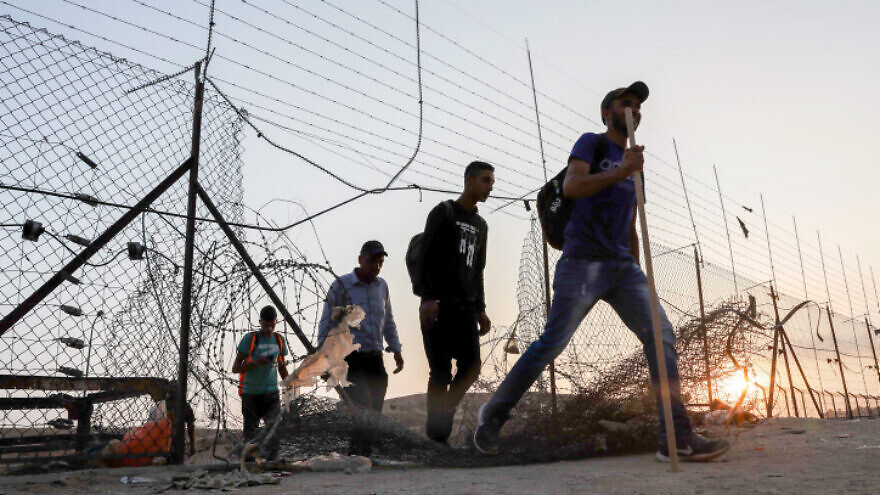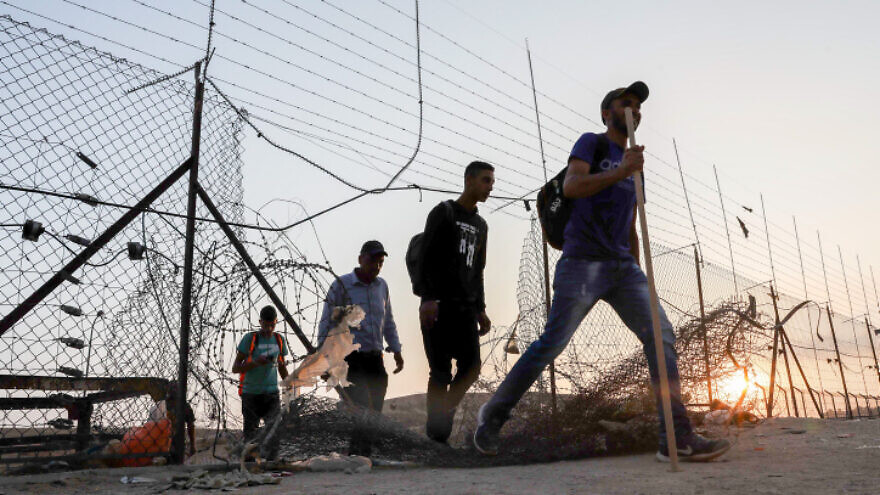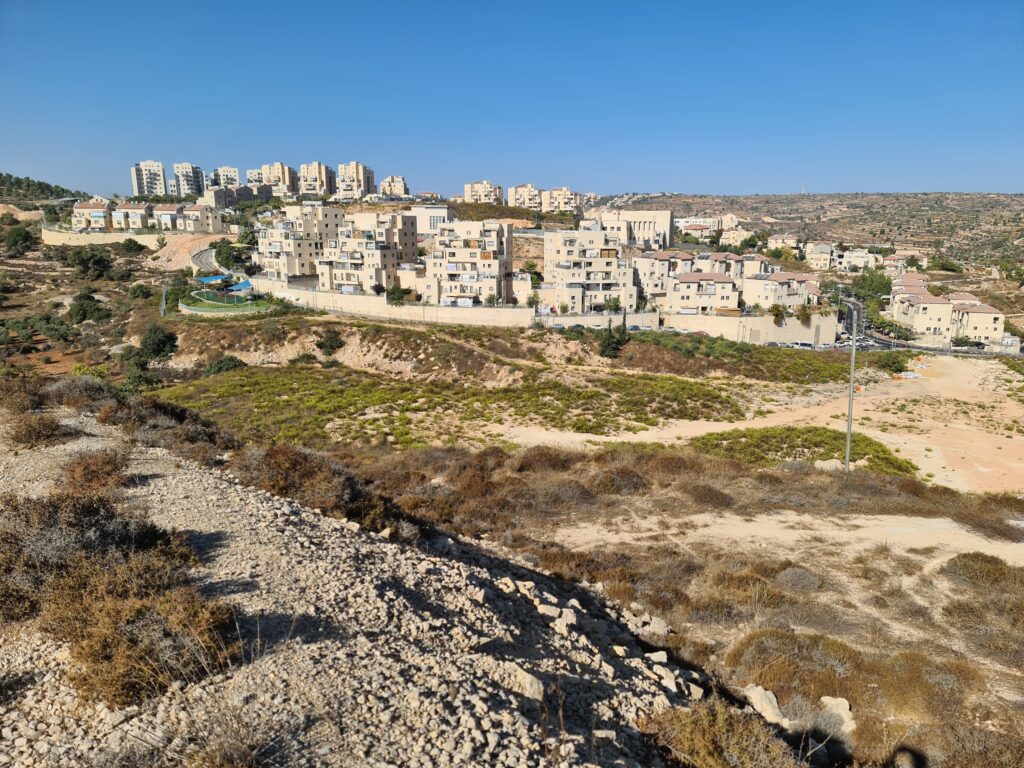Your cart is currently empty!

“You Want Money at the Risk of Our Lives!!”

“You Want Money at the Risk of Our Lives!!”
As many of you know, Palestinian workers have been behind much of Israeli building construction for decades. Here in Judea & Samaria (the “West Bank”) even more so, since Arabs are a majority of the population. After the October 7 pogrom, it became clear that many “friendly” workers, some of whom literally exchanged kids’ birthday presents for years, had given data on each home they worked in the Jewish area near Gaza, including who has a gun, how old the residents are, and their work schedules.
While it’s likely that some Palestinians have nothing against us, it’s well known that Hamas will approach Palestinians with connections to Jews and demand information by threatening their lives and those of their families. So we cannot know which workers are against us, or who can be forced to act against us. This stark reality has led many Israelis to question who they can trust to work in their communities, especially given recent polls showing that around 73% of Palestinians support Hamas’s October 7 attack on Israel and their radical ideology of eradicating the Jewish state.
After October 7, all Palestinian workers (with the exception Arab citizens of Israel) were forbidden to enter Jewish towns. The resulting labor shortage is painful, so the pressure to readmit Arab workers has grown. The mayor of Efrat asked the IDF (who administers Judea and Samaria) for permission to bring some in for construction projects. The IDF is surprisingly liberal; many of its officer corps seem to agree that Judea and Samaria are not “proper Israel” and are less friendly to Jews in the area than one might expect. Predictably, the IDF gave permission.

(source: JNS)
There is a security gate about 5 minutes walk from my home, a mere 10 minute walk from the Palestinian village from which many workers have come to build most of Efrat’s buildings over the past 40 years. When word got out that Arabs would be admitted again in July, about 75 Efratians with signs, a microphone, and a defiant spirit came to the security gate and blocked the entrance, shouting at the Jewish contractors, “You want money at the risk of our lives!!” and similar expressions.
The demonstrations spent all of Sunday and Monday outside of the gate, and eventually the Palestinan workers gave up and walked back home. Most of the demonstrators’ ire was not directed at the Palestinians, but at the mayor and the Jewish contractors who hire them (the Arab workers). But on the third day, Tuesday morning, we lost: A group of Israeli police (not from Efrat, to assure they would follow orders) came in, pushed aside the demonstrators (roughly at times), and escorted 4 or 5 workers into a contractor’s car, which drove off to a work site some 4 kilometers away.
It’s worth noting that most of the leaders, planners, and demonstrators this week were women, perhaps because many men are in the army. This isn’t the first time the women of Efrat have taken a stand. Some dozen years ago, when the IDF administrators and the Israeli government decided to give a large area between Efrat and Beit Lehem (Bethlehem) to the Palestinians, about 20 Efrat women planted themselves there for weeks on end. Their determination and clever media strategy resulted in the government reversing its position, allowing Efrat to expand there instead.

On Tuesday night, we gathered outside City Hall to demonstrate during the city council meeting. Despite the small turnout of only about 40 people, something unexpected happened. We heard through a cellphone that the council had decided to forbid all foreign workers from coming into Efrat for two months while looking for alternatives (i.e., workers from India, Sri Lanka, etc.) and then reevaluate the situation.
My wife Sharon and I moved to Efrat from Los Angeles only 2 years ago. This was my first experience of local politics here. The demonstrations were fervent and loud but, law-abiding. My sense is that most of the demonstrators worked with and hired Palestinian workers for years before last October 7th, but the apparent benefits of labor cost savings and cross-cultural familiarity have been proven to be illusory.
Organizations like Byadayim Shelanu, meaning “In Our Hands,” have been formed to advocate against hiring people who don’t have Israel’s best interests in mind. They argue that allowing these workers into Israeli neighborhoods poses a significant security risk. As we navigate these complex issues, we must balance our security concerns with our economic needs and our hopes for peaceful coexistence.
The government has approved the construction of another 7,000 housing units here in Efrat, which by my rough calculation will double its population. Even when/if many workers from other countries come in to reduce Israel’s need for Arab labor, construction costs are likely to rise considerably. And yet the overall optimism, the continuing aliyah (immigration to Israel), the admiration for rank-and-file IDF personnel, and widespread acceptance of increased dangers from internal and external enemies, makes it a continuing honor to be here in Israel.
It’s a difficult path, but one that we, as residents of Efrat and citizens of Israel, must walk together. As we look to the future, we must find ways to ensure our safety while also addressing the economic realities of our growing communities. The dilemma of Palestinian workers is just one aspect of the larger challenges we face in building a secure and prosperous Israel, but it’s one that touches the daily lives of many Israelis in profound ways.
You can learn more about this complex issue in a recent Israel365 News article “Building Israel With Our Own Hands”. Keep God’s Land is dedicated to strengthening and defending Israel’s right to its biblical heartland, with the ultimate goal of Israeli sovereignty over Judea and Samaria.
The post “You Want Money at the Risk of Our Lives!!” appeared first on Israel365 News.
Israel in the News